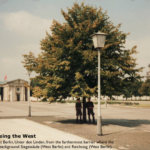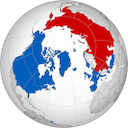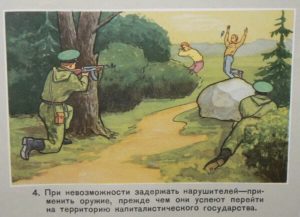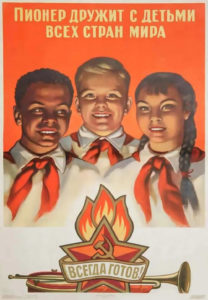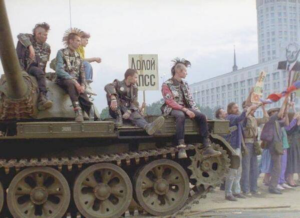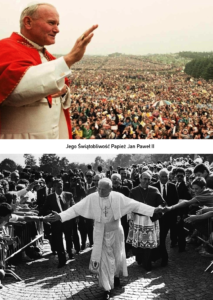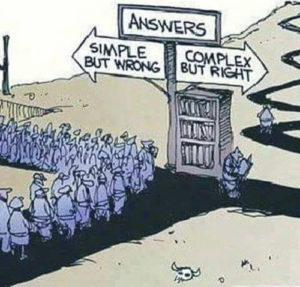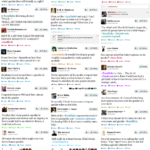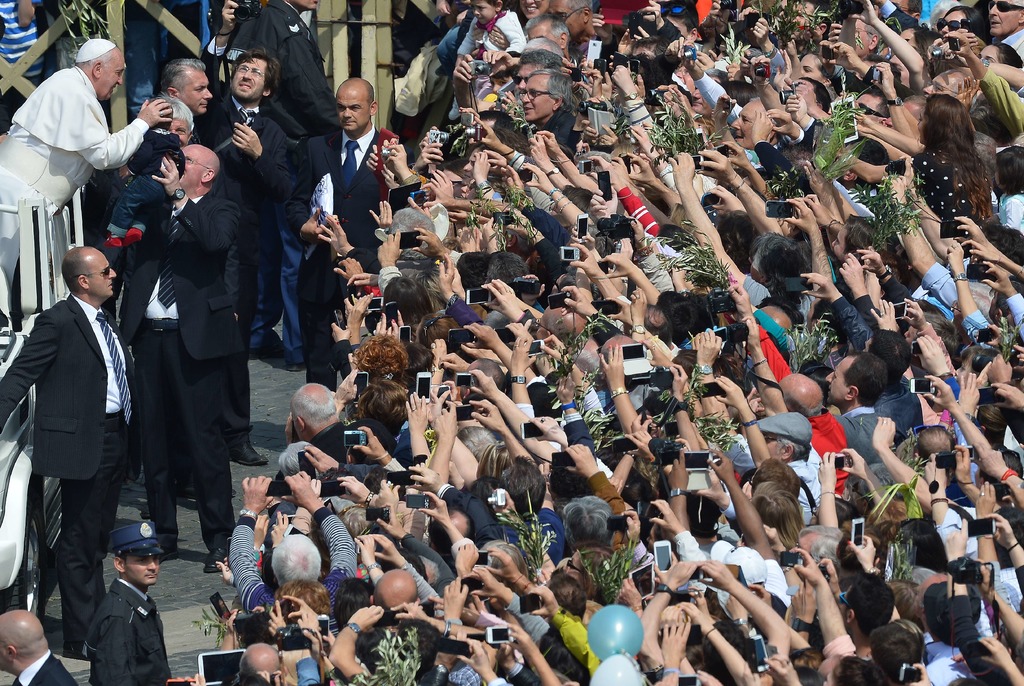 Life is like a
Life is like a box of chocolates kaleidoscope. Throughout our lives we see changing patterns that emerge and vanish as epochs come and go. Sometimes the speed of rotation is faster, sometimes it’s slower, sometimes the kaleidoscopes are not moving at all.
 Imagine an average man, let’s call him Hieronymus, who lived in let’s assume XIVth century in let’s assume the Holy Roman Empire. He had a kaleidoscope too. What has he seen in it during his life? Always the same picture: same society, same values, same technology. What changed between his life under Henry VII and his life under Charles IV (provided the guy survived in the Plague)? Absolutely nothing. Hieronymus’s kaleidoscope didn’t move a single degree, all life long he has been observing one primitive pattern, one utter boredom.
Imagine an average man, let’s call him Hieronymus, who lived in let’s assume XIVth century in let’s assume the Holy Roman Empire. He had a kaleidoscope too. What has he seen in it during his life? Always the same picture: same society, same values, same technology. What changed between his life under Henry VII and his life under Charles IV (provided the guy survived in the Plague)? Absolutely nothing. Hieronymus’s kaleidoscope didn’t move a single degree, all life long he has been observing one primitive pattern, one utter boredom.
Some generations are luckier. My Generation X (borns between ±1965-1975) is among the luckiest ones. Okay, we didn’t enjoy the “Trente Glorieuses” and “Wirtschaftswunder” of the Baby Boomers, but we can’t complain: we knew no Black Death, no World War I/II, no nuclear bombing, no ice period, no slave trade, no witch trials, no hunger. Our lives are safe and extremely interesting because the speed of rotation of our kaleidoscopes is faster than ever in human history. Our kaleidoscopes are fascinating. Here’s what I have seen so far in my personal kaleidoscope ↓
? Pattern #1: Classic Socialism (70s and early 80s)
I am born into a state that will take care of me entirely, from A to Z. There’s little choice, but I don’t have to choose. It’s all included, the state regulates everything. My future is easily predictable and programmable, visibility is absolute. Two conditions: 1) be loyal, at least seemingly, and 2) work.
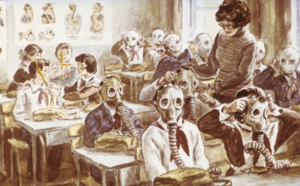 Fear of a nuclear war. Fear of being sent to Afghanistan and killed by a mojahed in the Salang Pass. Pre-military training is part of the school programme: I know how to wear a gas mask, what dose of radiation is lethal (800 rem, every schoolboy knows that) and what to do, second by second, if I see a mushroom cloud. At school we have a Kalashnikov (locked in a safe, disabled and without cartridges of course), we learn to assemble it in 40 seconds, as per the Army’s norm. Our teacher of military training and civil defence is a retired captain of the 2nd rank (= frigate captain), he wears a black naval uniform at school. My class goes to a shooting range to shoot with a Kalashnikov, one magazine per schoolboy. A “contest of march and song” — paramilitary parades at school with self-made shoulder straps attached to the dark blue school uniform; this year we are marines, last year we were paratroopers. My commands ‘Left! Left! One-two-three!’ are synchronising the Prussian goose step of my 10-years-old classmates.
Fear of a nuclear war. Fear of being sent to Afghanistan and killed by a mojahed in the Salang Pass. Pre-military training is part of the school programme: I know how to wear a gas mask, what dose of radiation is lethal (800 rem, every schoolboy knows that) and what to do, second by second, if I see a mushroom cloud. At school we have a Kalashnikov (locked in a safe, disabled and without cartridges of course), we learn to assemble it in 40 seconds, as per the Army’s norm. Our teacher of military training and civil defence is a retired captain of the 2nd rank (= frigate captain), he wears a black naval uniform at school. My class goes to a shooting range to shoot with a Kalashnikov, one magazine per schoolboy. A “contest of march and song” — paramilitary parades at school with self-made shoulder straps attached to the dark blue school uniform; this year we are marines, last year we were paratroopers. My commands ‘Left! Left! One-two-three!’ are synchronising the Prussian goose step of my 10-years-old classmates.
When I’m 9 or so I write a letter to Zbigniew Brzeziński, in Russian, urging him to stop the arms race and to respect the SALT II agreements: my political awareness is very high, I read Soviet newspapers and I watch political programmes on TV where they speak about Pershing II, nuclear tests in Nevada, etc. All this is real and frightening.
The Iron Curtain. The Berlin Wall in all its beauty, seen from the Eastern side, but sterile without graffiti and not closer than ~200m. A Soviet diplomat in the USSR Embassy on East Berlin’s Unter den Linden: “When out of the Embassy, immediately turn right, don’t approach the Brandenburg Gate, you have no business there, you’d better not even look at the state border”. And of course we do the opposite, we approach the Brandenburg Gate as close as we can.
? Mr Volkov [proper names may be modified across this post], a young diplomat from the Soviet consulate in Leipzig, suddenly flees to West Berlin by trivially crossing a checkpoint with his green diplomatic passport — there’s a big scandal in the Soviet consulate, a shock. It’s amazing — I have seen Mr Volkov just a couple of days ago in the consulate, he was friendly as usual, but now it’s certain — nobody (not even his family members) will ever see him again. His crossing to the West was of no return, like a flight to Alpha Centauri: emigration is an equivalent of death. Officially he is considered as traitor, but practically many people think deep inside: “Wow! So easy!”.
? A day trip to the castle of Wartburg, the guide lets drop: “And by the way, those trees far on the horizon are West Germany”. The guide continues speaking about Luther and Goethe, but nobody is listening to her any more because we are all staring at the crowns of Hessen-rooted trees; we can’t see the watchtowers or the death strip, we see just plain trees in a forest far away, but that’s the West, that’s Mars.
? S-Bahn Friedrichstraße in East Berlin, it’s not today’s city centre, it’s the end of the world: “Last stop, all change!”, and here are the GDR border guards in grey uniform on the platform.
The Iron Curtain is present in everyday life too: in the fridge we have a heavy 3-litre jar of Ossetra caviar (not a big thing, its upper layer when dried up is given to the cat) and a bundle of smoked sturgeons directly delivered from the Caspian, but I have never seen a pizza or an artichoke. I have no idea at all of what “mozzarella” or “paella” could mean (flowers? female names?), I don’t know these words even from the books. On the Eastern side of the Iron Curtain I can easily have a natural fur coat from Siberia, but I can’t have a Levi’s from America. I have never heard of McDonalds, KFC, white chocolate and Donald Duck. I intuitively think that cappuccino is a cheese, but I am not sure.
Two TV channels in Leningrad, four in Moscow. Bad news can only exist in the West: constant economic crises, unemployment, exploitation, hijacks, Ulster, ETA, Union Carbide — it’s all orchestrated by the CIA, Carter, Reagan, Thatcher and especially Begin. In the Socialist world there are no bad news in principle: no crimes, no aircraft accidents, no natural disasters, no train derailments and no problems. There officially exist “isolated weaknesses”, but they are minor and always addressed by the Party. As a result the level of stress in the society is very low. Printed press is 100% Soviet or foreign Communist (Humanité, Granma, Morning Star, Scînteia, Trybuna Ludu, Rabotničesko Delo, Borba, Der Weg, Neues Deutschland…). But luckily there are “voices” on short waves: Voice of America, Voice of Israel, BBC, DW, Radio Liberty, Radio Free Europe, Radio Vatican — jammed in big cities, a bit better received elsewhere, they are the real source of information: I learn about Chernobyl from Radio Sweden, not from the Soviet TV. Western pop and rock music is more or less well known, but it comes from magnetic bands only, never from the Soviet official media. Everybody knows the tunes, but nobody knows how the guys from Ottawan or ABBA look like. Certain Western films are shown in theatres, but these are mostly comedies, thoroughly selected and always censored (Il bisbetico domato, La grande vadrouille, Le coup du parapluie, Disco Dancer,..).
Propaganda and brain-washing are strong and odious, but they are counterbalanced by healthy cynicism — there is a huge gap between what people do, say, and really think. Only a minor part of the population take the Communist ideology seriously. Ironic and even cruel jokes about Lenin, Brezhnev, iconic heroes of the revolution and their wives and girlfriends are widespread and easily told beyond the official circumstances. When they go to the May Day “rally”, it’s to tick the box of formal presence and to be left in peace for a while. Out of thousands of marchers in the Palace Square or Red Square, whó reads the slogan on the banner (s)he was given to carry? — nobody. Who really cares about “zionism”, imperialism or solidarity with the Cuban peasants? — nobody. It’s clear to everyone: it’s a show, a must-play game. In summer pioneer camps politics is limited to hoisting the red flag every morning, but then the young pioneers are relatively free for 23½ hours for sport, beach and discos at night. When I speak to the North Korean students I realise that I am as endlessly free as the Statue of Liberty.
In the late 70s – early 80s there is almost no way to find non-official sources of information besides the jammed “voices”, but, unlike today in 2019, many people (mostly in big cities) try to form their own opinion, they seek alternative sources, they apply earplugs to their ears and filters to their eyes. Maybe only the elderly blindly eat the pre-packaged propaganda, the others don’t. The Soviet people are reluctant and critical, but not publicly. They say what they think only among close friends and family members, usually around the kitchen table after a meal: this is called “kitchen conversations”. Being part of a kitchen conversation means membership in the inner circle and a high degree of sympathy and trust.
Dual standards, dual morality. The proclaimed “proletarian internationalism” goes in parallel with antisemitism: the Soviet national sport is to “unveil the Jews” among colleagues, neighbours and celebrities; and the KGB is severely persecuting the underground teachers of Hebrew. The proclaimed superiority over the capitalist system is combined with the strong conviction of the masses that socialism sucks. The official goal of the socialist political system is communism (total equality of condition, common ownership of everything), but everybody clearly understands it’s a utopia. Marxism-Leninism is a quasi-religion, you must be formally in, but you may keep a low profile and they let you alone more or less.
Moving paper instead of voting. My grandfather “wins” a one-name Kobzar-only “election” with 99.8%, and my grandmother is sad, she can only accept 100.0% as a satisfactory result.
Those 0.2% must be very courageous people. There’s only one name in the Soviet ballot, and you are expected to receive the ballot with only one name on it and to put this blank ballot in the box. All blank ballots found in the box are counted as ‘yea’ for the sole candidate. To vote ‘nay’ you have to strike the name off the ballot. It’s a suicide to do it openly. But there are a couple of voting booths, you can do it in the booth. But if you go to the booth in front of the “election commission” it’s obviously to vote ‘nay’, so 99.8% don’t go to the booth and don’t even take out a pen: they simply receive the ballot, walk 2 metres to the box with the unfolded ballot in hand and drop it in the box. That’s it. After the “vote” there’s a concert in the lobby and a sale of things that are usually in short supply: good books, cacao powder or sandwiches with Finnish salami.
We are the “Latchkey Generation” with a key on the necklace from the age of 7. All mothers work, I know no housewife — the socialist system offers real equality between men and women without artificial quotas and inclusive language: M=F equality just works, full stop. Families are small, we generally have no or just one sibling, no one has two. Many of us have divorced parents, and I know no Gen Xer who would be broken because of this — we cope with the difficulties by ourselves, there are no such professions as psychotherapists, ombudsmen or social advisers — at all. Mollycoddled children? — ha, not us! Our young parents Baby Boomers are focused on themselves, not on us. Their free-range parenting model is optimal for us, it gives us Gen Xers a great degree of freedom: the parents only know a small part of where we really spend time and what we really do.
We get to the roofs and basements of the block buildings, we cut down the locks and explore the underground labyrinths where the heating pipes lie, we spend hours in remote wastelands, we make quests in the abandoned construction sites in darkness, we make chemical weapons with the toxic calcium carbide and rockets with gunpowder, potassium permanganate, match heads and lots of boldness and creativity. We swim in the ponds and rivers where swimming is strictly forbidden, we never wait for green at the pedestrian crossings (if we use those), we cross the immense city on the 8-lanes highways zigzagging among the smoky Euro-zero non-compliant lorries with a one-gear bike and no Gen Xer has ever heard of bike paths or helmets. Those whose bikes have no brakes (spare parts for bikes are in short supply) brake by putting their shoe on the tyre of the front wheel. We get under the railway platforms to flatten the coins on the rails — all this without lifeguard surveillance, airbags, safety belts and even insurance — we know that nobody is behind us to protect.
Life is unfair and often cruel, we know it and we deal with it. Scuffles, bruises — we deal with it, nobody complains, nobody reports. We are friends-centred, not parents-centred, we acquire social skills without parental guidance. We bear full responsibility and we solve our problems without involving the parents who, always on-the-go, can hardly remember our best friends’ names.
Books! Imagination knows no iron curtains and departure visas. We have no comics, we have few films, we have just black printed letters and we make miracles with these letters imagining heroes, locations and historical epochs. I walk the streets of New York with Holden Caulfield and I go down the Mississippi River with Uncle Tom, I get to the roofs of Stockholm with Svante Svantesson, I reach the sea depths with Captain Nemo, I cross Africa with Umbopa and Allan Quatermain — reading is breathtaking.
High prestige of science and knowledge: lectures of physics and higher mathematics are broadcast on the Soviet TV every day. Superfluidity, squaring the circle, crossing of Lobachevsky’s parallels etc. are current topics that are explained in TV programmes and short documentaries shown before a projection of a film in a cinema. Ignorance is shameful.
Dreaming is big: space, exploration of other planets and galaxies, struggle of political systems in an attempt to find the fairest one for the humanity. Are we alone in the Universe? Will the synchrophasotron tell us more about how everything came into being? What came first: matter or conscience? Is spacetime continual or discrete? These questions are ardently discussed in the living-rooms and kitchens among our parents’ friends. Most thrilling news: yet another cosmonaut has been sent to the orbit, I know them all by name (Dzhanibekov, Chrétien, Savitskaya, Jähn, Méndez,..) and I follow their missions and scientific experiments.
Nation-wide atheism in the USSR: no Christmas, Passover or Ramadan, no nothing — Hieronymus would be very much surprised. I acquire some feeling and knowledge of the Western Christian tradition in Germany, but the Eastern Orthodox tradition remains a total blank spot, it doesn’t exist in any form. Thanks to the Russian classic literature I know, purely theoretically, what is was Easter, but I have no idea when it is and how it is. And nobody around me does.
Christmas was abolished in the 1920s, so even our grandparents have nothing to say about it. However all the attributes (excepting the crib) have remained: a decorated tree with a 5-pointed (not 6!!) star, a table set with champaign, gifts, wishes, decoration of houses, schools and streets, candles, TV shows, post cards, sweets, countdown to midnight — it’s all present, but it’s called New Year: the Eve occurs on 31 December, and the holiday is 100% secular. The key actor, visually identical to Santa, is called Grandfather Frost: this is an old Slavic personage from the forest, not Saint Nicholas.
I use words and expressions like “pearls before swine”, “scapegoat”, or “cast the first stone”, but I don’t know where they originally come from.
Only few religious buildings are “active” — most are transformed into workshops or warehouses.
The former main cathedral of the Russian Empire (St. Isaac) is transformed into a museum with the world’s biggest (really gigantic!) Foucault’s pendulum hung under its dome aimed to visualise the Copernicus’s theory of rotation of celestial bodies. The former Cathedral of Our Lady of Kazan on the Nevsky is the Museum of Religion and Atheism. The Church of the Assumption of Mary on the Vasilyevsky Island is a covered skating rink with a garderobe in the former altar, then it is converted into public baths. The Christ the Saviour Cathedral doesn’t exist (it was blown up in 1930s), a large heated open-air swimming pool is built on its remaining robust foundation, it’s great to swim there in winter with friends looking at the Kremlin through the clouds of hot steam.
Nobody ever speaks about religion, god, rites or spirituality, nobody practices — not because it’s prohibited (the Soviets do a lot of what is prohibited), but simply because in the Soviet Russia religion is seen as a clear sign of backwardness. The Serbs continue, like centuries ago, to venerate their saint patrons in the socialist Yugoslavia under Tito; the pious Poles, like centuries ago, live their lives between their home and their kościół (church) in the socialist Poland, but in the first state of workers and peasants I’m observing a total absence of any religious element: it’s a tabula rasa, as if 1000 years of Christianity had never existed in these lands.
? The only (supposed) believer I’ve met by ~ 1984 is a 90-years old lady who lives in a remote village between a swamp and a prison labour camp: the wooden walls of her izba are decorated with icons, so she is presumably religious. That’s somewhat understandable: who would not come to believe after having lived 90 years between a swamp and a prison labour camp?…
Relative economic equality: roughly all of 293 million are poor in 2019 terms. There are no homeless, no unemployed, no hungry, but there are no rich either. Today’s story-tellers about their “deep pockets” under the socialism lie. No one (not even Brezhnev who lives in an apartment on the 4th floor) is rich in the international sense of the word suggesting private property, liquid assets in a convertible currency at a market price — it’s impossible, the market simply doesn’t exist. Money matters, but more important are positions and connections, they give access to social lifts and distribution channels.
No competition as the only employer in all sectors is the socialist state. Self-employment is not conceivable even in theory. Demotivation at work. No freedom of settlement: choosing a big city to live in is not possible, one has to be “assigned” by the state to a job in a specific place (connections help a lot), and assignments to Leningrad and Moscow are especially hard to obtain.
Socialism inescapably means bad quality of goods and very bad quality of services. Soviet toys are dreadful, Soviet vegetables are terrible, socialist cars (that cost an equivalent of several years of salary and require 8 years of staying on a waiting list) break down all the time and their spare parts can only be obtained through connections. Soviet cassettes act as sanders wearing out magnetic heads, ORWO is better, but nothing compares to TDK.
Those who complain on TripAdvisor about “unfriendly staff” in modern hotels make me laugh. They (luckily) don’t know what “unfriendly” is. I never complain about service, I’ve seen the absolute zero and even negative values.
I know that after 5 years of university I will be given a job provided by the state, but it will likely be a “job by distribution” — the state assigns the young graduate to a specific job in a specific location for at least 3 years, and only good connections can help avoid a mandatory mission to Transbaikalia. Salaries are guaranteed, they don’t depend on the quality of work, you have to show up in the morning and in many cases it’s ≈enough. Gaps among salary levels in different sectors are not large (equality works), but they are weird: the best paid are miners, workers as a whole and army officers; the worst paid are doctors, professors, scientists, engineers and teachers.
Entrepreneurship is a criminal offence. Transactions with foreign currencies (e.g. buying/selling Finnish markkas or US dollars) are a criminal offence. Unauthorised departure from the Eastern Bloc is called “desertion”, qualified as “treason” and is (surprise!) a criminal offence. ‘Criminal’ is not an empty phrase — in worst cases (when with aggravation and of a particularly large scale) the maximum punishment for each of the above (even for buying the dollars) is… death penalty — they execute at dawn, by one shot into the back of the head, everybody knows the horrible procedure in the country that invented Gulag. Career breaks of more than 4 months are a criminal offence: max. punishment is not shooting, thank goodness, but 5 years of hard labour, likely in Mordovia, as it was the case of the Nobel laureate Joseph Brodsky. For minor misdeeds, especially of moral nature (flagrant individualism, adultery, regular coming late to work, skipping public activities, drinking in public places), there are “courts of comrades“: paralegal burlaw “courts” consisting of colleagues or neighbours who publicly review somebody’s behaviour, get into every detail of the “misdeed” that can be quite delicate and make the defendant apologise and repent in front of the “comrades”.
But all this is for the adults, for the preceding generations. For us Gen Xers of the school age the socialist coercion stops at “subbotniks” (“volunteer” manual work on a Saturday, 1-2 times a year), collecting paper and metal for recycling (every month), weekly mandatory smooth brain-washing sessions (so-called “polit-infomatia“) held by the pupils themselves (I am responsible for the international news), and some after-school activities like mandatory “solidarity fairs” — selling your homemade shit and buying the homemade shit made by your classmates — all proceeds will go to the Sandinistas.
Grey sombre scenery in the USSR, slightly brighter in the GDR. Compared to the USSR, East Germany seems the El Dorado of the Eastern Bloc: better-dressed courteous people with less complexes, FKK, DDR Fernsehballett, no visible shortages, no queues, abundant offer of goods which are of better quality, higher purchasing power for the working and especially for the retired, larger flats, cafés and restaurants everywhere, higher overall living standards, existing motorways, existing schedule for trams, ideally clean trains and public spaces, mild climate, friendly staff — and all this amid European culture with its Christmas markets and pipe organ concerts in Bach’s Thomaskirche.
? The GDR-USSR contrast is best seen when the “trains of friendship” arrive: groups of poorly and nearly identically dressed women (in dark green coats) and more rarely men (in dark grey coats) from the faraway Soviet province invade East German department stores buying everything they see. That’s pitiful and understandable: their shops in small Siberian towns or Kirghiz kishlaks offer 5% of this, at best.
? There is a small grocery in Leipzig’s Nordplatz in the Soviet school N°77 selling ordinary East German food to Soviet citizens only: at the entrance stands a Soviet soldier with an AK-74 on the shoulder, he easily discerns the East Germans and prevents them from entering the shop: “Nein, nein, nur Russisch. Zurück!”.
 Healthcare is 100% free, its cost is literally 0.00, but the quality of this free service is low. Connections and bakšiš help the situation. Education is 100% free from kindergarten to Ph.D. State-defined prices of pens, medicines, chairs and forks are engraved/embossed on them at the factory, these prices don’t change for decades: a fruity ice-cream is always 7 kopecks in any shop across the biggest country in the world, ‘Quasi’ is always 0,20 M. Shortages. Waiting lists. Half of what you need is sold out. Queues for things that you need, might need or don’t need at all — it’s wise to build up inventory in any case. You’d better get into the queue first and then ask what is on sale. Yeah, that’s the real hard-core socialism, not a Mitterand-style dreamland. The theory of socialism is a beautiful rose, the practice is bloody thorns.
Healthcare is 100% free, its cost is literally 0.00, but the quality of this free service is low. Connections and bakšiš help the situation. Education is 100% free from kindergarten to Ph.D. State-defined prices of pens, medicines, chairs and forks are engraved/embossed on them at the factory, these prices don’t change for decades: a fruity ice-cream is always 7 kopecks in any shop across the biggest country in the world, ‘Quasi’ is always 0,20 M. Shortages. Waiting lists. Half of what you need is sold out. Queues for things that you need, might need or don’t need at all — it’s wise to build up inventory in any case. You’d better get into the queue first and then ask what is on sale. Yeah, that’s the real hard-core socialism, not a Mitterand-style dreamland. The theory of socialism is a beautiful rose, the practice is bloody thorns.
And before I turn the kaleidoscope — thank you Socialism for having filled us Gen Xers with common sense and healthy cynicism. For having taught me not to blindly follow the crowd, to always reassess the received postulates, to be critical, to activate my own brain, to form my own opinion and to seek truth. For valuing freedom because I do know what unfreedom is. For creativity and outside-the-box thinking (indeed, necessity is the mother of invention!). For having made me resilient in different situations and unpretentious in my tastes and habits: a truffle will always be just a mediocre mushroom with a questionable taste (there’s much better), a Rolex is nothing else than an ordinary time measurement device with two hands (there’s much better), and the snow of Gstaad / Verbier has the same chemical formula as anywhere else: H2O. (And I will always be confusing tapas and tacos — doesn’t matter, both are just food, just calories). But first of all thank you Socialism for having vaccinated us Gen Xers against all sorts of dogmatism, against indoctrination and brain-washing, against demagogy, against hypocrisy and manipulation, against all those marches in support of little sphinxes in Krakozhia, against the rose in the hand and the hand on the heart. My anti-bullshit vaccine is life-long, the Soviet-made antibody was of a very good quality.
? Pattern #2: Perestroika (1986-1991)
Just one tiny piece of glass is added to the kaleidoscope, but what a change! Mikhail Sergeyevich Gorbachev — I see him in person on the tribune of Lenin’s mausoleum and I am greeting him very enthusiastically, can he hear me? I am a witness and actor of one of the brightest pages in human history that has just begun: dismantling of one of the most repressive regimes that the world has ever known. The start is slow, but then the avalanche is exponential.
The change starts with “Acceleration”, but you can’t accelerate a coffin. Gorbachev introduces “Pluralism of opinions” — it’s unbelievable in 1986 (and in 2019 too). Quickly comes Glasnost with its revolutionary books, publications, films and television. A reading marathon: “Have you read this? Have you read that? Can you lend me this book overnight?”. Sleepless nights with a borrowed book, 24 hours are not enough to read everything. I read the Bible at the age of 19: in the Roman Catholic version (in the USSR the Bibles are not printed at all) and I make tons of interesting discoveries, only now recognising the source of expressions, understanding allusions, unlocking art and culture. The democratic media like The Moscow News or Ogonyok are hard to get: fresh copies are sold out within minutes, and they queue up at kiosks 30 minutes before the newsstand opens. Libraries can’t help: the most interesting issues are stolen.
Glasnost could have taken longer to start, but it is triggered by Chernobyl: the horrible truth is impossible to keep in dark. And Chernobyl is no joke even if you live far from the burning reactor.
? Soldiers are checking radioactivity of the lorries entering the city. At my request a soldier checks the radioactivity of my clothes and my bike, then he says with a bitter grin: “That’s fine, young man, you’re going to be around for a while”.
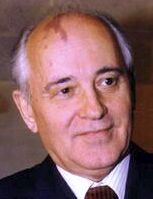
Михаил Сергеевич ГОРБАЧЁВ
And then she comes — Perestroika — a perpetual spring, a unique feeling of an upcoming radical change. Streets, metro stations and cities change their names, my hometown Leningrad is no more. First McDonald’s in the USSR: the first enthusiastic visitors are waiting for 2-4 hours in a queue to get inside, two months later I will spend only 45 minutes to get inside. First Pizza Hut that only sells for US dollars which are now legalised. Emigration is gradually legalised, Soviet “departure visas” are easy to obtain. The “voices” are not jammed any more, I listen to them every night learning languages and travelling the world on radio waves. State censorship is gradually dropped. Live “TV bridges” between Moscow and New York for the first time in history. First Soviet talk-shows are broadcast live with a direct phone line, and the watchers don’t believe it’s live, they call and try to verify if it’s live by asking questions about the exact time and the current weather.
But the most important news is that there will be no nuclear WWIII. Apocalypse is cancelled. Thank you very much Mikhail Sergeyevich!
Few are those who have a VHS at home, most of us go to the newly established “video halls” to watch an American movie dubbed by an unknown amateur with a clothes-peg on his nose aimed at making his voice unidentifiable: the KGB has just stopped persecuting such underground dubbers in its holy war against the Western VHS proliferation.
| ↑ The anthem of Perestroika, West-made | The anthem of Perestroika, East-made. If the video is unavailable, then follow this link. |
The Soviet Perestroikan television shows new incredible things: fall of the Berlin Wall, the Velvet Revolution, triumph of Solidarność, fall of Ceaușescu, struggle for independence in the Baltic republics (Sąjūdis, popular fronts, a 675 km long human chain from Vilnius to Tallinn) and elsewhere. Every day there’s something incredible happening in Hungary, Bulgaria, Albania. The Warsaw Treaty, Comecon and the whole circus is falling apart like a house of cards. Tricolors with a hole in the middle are the symbol of the moment. It’s super-great everywhere in Central and Eastern Europe, only Yugoslavia is quickly heating up and terribly explodes with Vukovar and Dubrovnik.
I extrapolate the Yugoslav situation to the USSR, it’s very similar and very frightening: 26 million Russians (1/5 of the total Russian population in the Soviet Union) live in the secessionist republics, half of which are unfriendly if not openly hostile to their local Russians. If Gorbachev, the commander-in-chief of the 4½ million Soviet Army, decides to deploy the army to “protect” those Russians and to save the Union by force like Milošević, it will open the
box of Pandoragate to hell: all 15 Soviet republics are stuffed with weapons and 4 of them have nuclear missiles — o-o-ps, bad idea.
Perestroika brings a new fashion: “revival” or “restoration” of the old pre-revolutionary realities. Very funny, because there is absolutely nothing to “restore”: the historical memory is completely erased by 70+ years of the socialist ideology, all traditions are broken and forgot, almost no survivor able to tell his/her pre-1917 experience is left. The Russians’ historical USB key had been formatted in 1917 and densely rewritten from then on: what is left on the key in 1990 is 100% Soviet. How do you want to “restore” a tradition that nobody knows about? As if today you were “coming back” to Saturnalias or the sacrifices of cattle in the Temple. Some people invent noble titles for themselves and design family coat of arms with badly aligned fleurs-de-lis and lions rampants looking like dying cats. Some Ivanovs proclaim themselves Ivanoffs and become arrogant towards the plebs without a coat of arms. Communists become monarchists, though there’s no monarch in sight. There emerge “Cossacks” after decades of non-existence: they wear self-made sabres and decorate each other with self-made medals.
It’s obvious that in the late 1980s there are only 3 addresses where the Tsarist characters can be found — museum, cemetery or Paris. But never mind: in every block you can now find a couple of earls, a Cossack general and maybe even a duke. Lenin is quickly replaced by Jesus / Moses / Muhammad depending on the ethnicity. Yesterday’s CPSU activists are asking priests to bless their messy mixture of pseudo-christianity, “scientific atheism”, paganism and fairy tales.
When I’m eligible to vote, it’s already a multiple choice among parties and 6 presidential candidates, it’s not about moving paper, it’s a real election. That same year I vote in a referendum “about the future of the Soviet Union”, I vote against the Soviet Union, my friends vote mostly for — we debate, but our contentions never put our friendship at risk. Whatever the vote, nothing can help the dying red monster: nationalist movements are on the rise in all republics of the Soviet Union prompting a rapid disintegration, riots and localised wars (Karabakh, Transnistria, Abkhazia,..).
Agony of the planned socialist economy, it’s completely exhausted. Ration coupons for the right to buy sugar and soap. When I turn 18 I am given additional ration coupons for cigarettes and vodka, that’s a clear sign of maturity. I’m indifferent, but most of the population are furious at the severe anti-alcohol campaign, it’s nearly Prohibition.
? My friend Leonid is a future chemist: he mixes up potatoes, sugar and yeast and hides the mash inside a huge empty matryoshka on the shelf. My friend Phil is luckier: his grandmother possesses a self-made distilling apparatus, she has gone through fire and water and she fears nothing, so Phil will likely taste some grandma-made moonshine in a couple of weeks, yum-yum.
Perestroika gets into trouble, it needs to be defended: during the coup d’état in August 1991 I’m in the centre of Moscow. In the Manège Square there are tanks with loudly running diesel generators atop the armour plate: the goal is to prevent soldiers to communicate with us. I try to shout to a young sergeant: “You won’t shoot on us, will you? Look at us, we are unarmed and peaceful, there are thousands of beautiful girls here among us, come on, join us if you are told to shoot. I see you are a good guy, not an executioner”, but the sergeant boosts his noisy generator and pretends he can’t hear me — that’s an alarming sign. We collect stuff around the Parliament and in the backyards nearby: we are erecting barricades. I am too late to see Yeltsin on the tank, they say he had finished his speech a minute ago. I am asked by an American journalist why I am here, I reply: “to defend my freedom and dignity”, it’s so obvious to me. We are unarmed and unorganised, but we are angry and determined to win. And we won.
? I am too late to witness the demolition of the statue of Dzerzhinsky in front of the KGB — when I get to the square the statue is already down and poured with red paint. I am observing the workers who are knocking down the “Communist Party of the Soviet Union” letters from the façade of the CPSU headquarters; I ask them to give me a letter as a souvenir or at least a screw, but they refuse.
I learn two important things: 1) “Yes we can” — when you are determined everything is possible, even dethroning the world’s second superpower in less than three days; and 2) liberty is priceless, it stands far above personal comfort, stability, money and social status. When I see the coffins of three young men who died on the barricades almost next to me I understand the literal meaning of the motto “Live free or die”.
Tunisia seems an ultimate Eden Garden to me in December 1991. From a balcony in Tunis I am following the final seconds of the Soviet Union on France’s Antenne 2. Palms outside the balcony, muezzin calling to maghrib prayer from a nearby minaret, warm December air smelling sea, croissants and cezve-brewed coffee, the Soviet Union shutting down — I must be dreaming! Unlike Slobodan Milošević, Mikhail Sergeyevich Gorbachev nobly refuses to save the unsaveable, and the Soviet hammer-and-sickle banner in the Kremlin is peacefully (!) brought down two minutes after Gorbachev’s speech and 74 years after Lenin’s October coup d’état. Gorbachev’s noble decision to step down and to turn off the lights prevents a massive civil war à la yougoslave and highly probably saves my life in a potential gigantic slaughter.
It’s incredible: the Evil Empire is no more, [almost] without blood and without opposition: no one across 11 Soviet time zones wants to defend the bankrupt socialist idea. I am 1000% certain: socialism is buried for good, Big Brother will never resurrect. It’s clear: the false Marxist concept didn’t work, equality of condition is a delusion.
I look back at the long history of socialism from Saint-Simon to 25 December 1991 and I have no doubt: socialism was so sickening and disgusting, its ideology was so unnatural that none of its elements will ever be solicited by the humanity. And it’s absolutely obvious to me: dogmatism and indoctrination have no place in the new world, it’s done forever with unfreedom, with censorship, with ideologies, with ‘1984’.
Hm-m-m, okay…
Two weeks ago I flew to Tunis from the USSR, but the day of return flight I am returning to another country with a different name and a double-headed eagle on the coat of arms. Four hours of flight with a cigarette in hand (inflight smoking is allowed behind the 20th row). The touchdown is hard and my kaleidoscope shakes once again, this time very abruptly.
? Pattern #3: Early Nineties in the Post-Soviet Russia
Forget what you’ve read so far. It’s all over, all of it. Life begins from scratch — the old system of coordinates is of no use, old virtues become drawbacks, old connections become useless, new qualities are needed, but nobody knows which ones. I’m in the post-Soviet Nineties.
The human history has known a number of examples of socialist revolutions and coups d’état, but nobody knows how to go back. The state abandons regulation, planned economy dies overnight, prices are liberalised that same night — the free market is born. The liberal reformist government of the young Russian Federation calls it “shock therapy”. As if with a wave of a magic wand, shops are filled with goods, and the ill-famed shortages of socialism vanish in a second: prices rise 10-20 times overnight, no more queues in Russia since 1/1/1992.
Very high inflation, daily price rises. Savings are exclusively in US dollars and German marks. Prices are displayed in “conventional units” (1 conventional unit = $1), otherwise it’s too tiresome to update the rouble equivalent every week. You can pay directly in dollars, the sellers are happy. It’s wise to immediately convert the rouble-denominated salary to USD or DEM, otherwise you lose 15-20% in purchasing power by the end of the month.
Airfields and stadiums are converted to huge open-air markets. I buy my first Casio watch on the stage of a former theatre. I know a number of people who have lost all their savings (and sometimes borrowed money) in financial pyramids which are aggressively advertised on television. I make my first investment with the privatisation voucher, my personal share of the Russian economy. Russia is for sale in every sense.
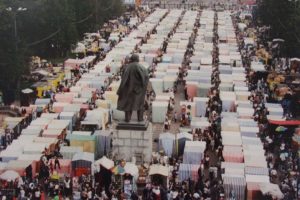 Total social disparity. Street markets everywhere, they are endless, people sell their possessions (books, dishes, shoes, jigsaws etc.) or what the “shuttles” (former engineers, scientists, lecturers of Marxism-Leninism made redundant) bring for sale from Poland or Turkey: underwear, jeans, trainers, lipstick. Multiple beggars in the street.
Total social disparity. Street markets everywhere, they are endless, people sell their possessions (books, dishes, shoes, jigsaws etc.) or what the “shuttles” (former engineers, scientists, lecturers of Marxism-Leninism made redundant) bring for sale from Poland or Turkey: underwear, jeans, trainers, lipstick. Multiple beggars in the street.
? In a grocery an old man is kindly asking me to buy him some bread OR milk — he doesn’t expect to have both.
? 10-years-old boys are quickly washing the windscreen of our corporate Volvo 740 at the traffic lights, they are very likely homeless.
? A lorry in downtown Moscow, its driver is loudly advertising the cubes of Sonja margarine: “Humanitarian aid! Directly from Germany! Low prices!”
Total freedom, absolute freedom, crazy freedom, nearly anarchy! Full freedom of the press, of mores, of associations, of speech, of movement, of everything. No limits at all, even sky is not the limit. Cultural and social disorientation. Manifestations of all kind, dozens of known and self-invented religions, prophets, charlatans and tricksters. Real democracy: 26 political parties are running for elections, 25 of them are populist.
Time of huge opportunities and time of huge risks: chances vary from -∞ to ∞. One may get fabulously rich in one month and lose everything, including freedom and life, a month later.
Rule of the jungle. Moral relativism. No more empathy, no solidarity, no social responsibility. The social tissue disappears. From then on, a massive vault-like door made of steel becomes the new symbol of the post-Soviet society — every man for himself now.
? Every day on my way to the university I see an old man begging in an underpass with a sign “Please give, I’m hungry” — and nobody gives. One day the man comes with a dog and changes the sign to “Please give, my dog is hungry” — and since then every time I walk by I see and hear people dropping coins into the bowl next to the dog. And I understand that something is fundamentally wrong with the mankind.
Crime and insecurity. Gang wars. One quiet summer night I can clearly hear machine gunfire in a public park in Moscow. Criminals’ argot invades the everyday Russian language, one of the new words is bespredél — absence of any rules or limits, total outrage in the Pulp Fiction style. Life doesn’t cost much: assassinations are priced around $2000 in Moscow (cheaper in the province), certain people seriously consider killing as a real option, among others, in solving their business and personal problems — it is called “to order somebody”, like you order a coffee.
The best gift for a girlfriend is a pepper spray.
I have heard that some of my secondary school alumni joined organised gangs with different outcomes: from long prison sentences to cemetery. Rows of fresh tombs in Russian cemeteries, terrible figures on the headstones: 1969-1992, 1972-1993 — all young Gen Xers. My ex-classmate Sasha is on the opposite side of the barricades: he graduates from the police academy and he is shot dead in the very first month of service.
The mini-Civil War in Moscow in 1993 is very close to me. I stay away from the riots, but at night I can clearly hear the tanks’ tracks clanking on a highway nearby. I see the burnt Russian Parliament some days later, that’s the place I was defending against the Communists two years earlier in 1991 — the picture is ominous and deeply symbolic.
Western goods invade the shops: Snickers, Kellogg’s, Tide, Uncle Ben’s, Amaretto. I’m still indifferent, but everybody knows that Royal™ 96% spirit from Holland is a Lego: 4:6 to water makes vodka, 2:8 to water + some concentrated sugared milk makes Bailey’s.
Cops check my ID near my university because they think I’m Chechen — the First Chechen War has just begun. The war is shown on TV in every detail including throat-cutting (no 18+ disclaimers, sorry). Images and commentaries are contradictory — yes, freedom of the press is absolute.
I strike a gentlemen’s agreement with my university friend Zubaìr: if I’m drafted and sent to Chechnya, I will desert from the army and I will find his house lost in the mountains of Dagestan (he gives me the address), his family is aware, they will be sheltering me as long as the war continues. Reciprocally, I pledge to shelter Zubaìr in case of anti-Caucasian pogroms in Moscow. Just in case, because everything is possible in the early Nineties in Russia, including pogroms.
Bribery is total. Everything can be bought for money, the only exception is a nuclear head. Trivial daily problems can be solved for $10. A $100 bill is a panacea, President Franklin can open any door. They say that in Chechnya a Kalashnikov can be bought for as little as $100, but a tank (a tank!) is more expensive: $3000 – 5000 [source].
Police is a “commercial” organisation: they will start investigating only if you pay (tariffs are publicly known), but even when paid, their action will stop where the interests of “serious people” are involved. Asked in a poll if it is good or bad to see a police squad approaching you in the middle of the night in a dark deserted street in a Russian town, 96% of the asked respond “very bad”.
? A driving school in Moscow in 1993, the day of the final exam. In a group of 20 students I am the only one who can drive, 19 others can’t. 19 others have paid a fixed price to the police officer who came to examine us, and many women in my group are receiving this driving licence as a “gift” from their husband or lover, many of them have never attended a driving lesson at all, they don’t have a clue what the “third pedal” is for. Individual “contributions” are centrally collected by our driving instructor acting as intermediary: he has a list of names in one hand and an envelope in the other. Those who put money in the envelope will have their licence without passing the driving test and even without getting into the car. I refuse to pay: I can drive and I’ll prove it, so my name is the only unchecked name on the list. We are two in the car: the fat major tells me to pull over and to get out of the car 60 seconds after my driving exam starts. Major says I ran a red light, though it was green, but… whom would they believe? This is major’s revenge for the missing $100 bill in the envelope. I don’t know why my second attempt worked a week later with another officer as I paid nothing, again. It must be an unexplainable miracle.
My student jobs include: loader, draughtsman, examiner of languages for a recruiting agency, market researcher, translator for a travel agency, tourist guide, van agent (salesman) for Mars Inc., interpreter for a private investor and for the American Presbyterian Church.
? The latter is the most ungrateful job — the “parishioners” are old ladies with zero Christian background and no idea about the Bible (that’s normal, cf. §1), they understand absolutely nothing of my translation of the sermon held in a cinema theatre, their only question is: “When will God punish Yeltsin?”.
Being a student intern in the Moscow office of an American consulting company for 2 years is very different. It’s about discovering the West economically and socially. Absolutely everything is revolutionary new: Soviet Russian students learn to structure and commercialise their ideas, they discover Lotus 1-2-3 on heavy thick laptops and collect empty Finland-made cans of Coke on their desks — it’s a tangible symbol of success in 1992.
Thank you Early Nineties for having put my pain threshold very high. If I resisted and survived this, then I am immunised against the fear of change, against the fear of difficulties, against whining, burnouts and spleen. I am insensible to discourtesy and offences, it’s hard to destabilise me. I have little fear overall. From then on, I know that absolutely nothing is set in stone, I take nothing for granted and I’ve learnt to enjoy life and to tell the difference between real problems and minor issues.
? Pattern #4: Free Europe (1995-2006).
 Crossing the border to the West in Rome Fiumicino in the early Nineties: it’s a revolution. I see, I live, I breathe the West. Western Europe is united, the young European Union is already born, but its bureaucracy has not yet grown to colossal forms, the Union of 15 is relatively light, balanced and manageable. It’s the spirit of Maastricht, the EU is in its best form driven by the Four Freedoms and based on the common sense and diversity of its members. It’s a union, not an empire. Schengen enters into force and removes internal borders even for foreigners — it’s awesome.
Crossing the border to the West in Rome Fiumicino in the early Nineties: it’s a revolution. I see, I live, I breathe the West. Western Europe is united, the young European Union is already born, but its bureaucracy has not yet grown to colossal forms, the Union of 15 is relatively light, balanced and manageable. It’s the spirit of Maastricht, the EU is in its best form driven by the Four Freedoms and based on the common sense and diversity of its members. It’s a union, not an empire. Schengen enters into force and removes internal borders even for foreigners — it’s awesome.
? Entering the formerly forbidden FRG from the Belgian village of Eynatten on a secondary road N68: a mere sign “Bundesrepublik Deutschland”, no watchtowers, no minefields, no barbed wire — thát simple?? I pull over at the border and I walk into and out of the former West Germany several times: in, out, in, out. Not a living soul in the area, the customs office is closed for good, nobody in the passing cars is interested in my “testing the border”. Nobody can understand the importance of this moment.
Cologne, Bonn (still the capital), Bochum, Marx’s Trier — these words used to be purely theoretical names for me, like seas and craters of the Moon, but it’s for real, I am eating a quarkkuchen near the Aachener Dom — that’s way better than watching the trees on the Hessen-Thuringia border from Pattern#1. First footprint in France takes place in the town of Maubeuge, it looks so Parisian!
Free, open-minded and open-hearted Belgian people. Little or no hierarchy in the relations, easy and pleasant communication. Rule of law. An excellent balance between order and freedom of spirit. Solidarity in action: the awful Dutroux affair prompts a strong indignation of the nation, it demonstrates the ideal of a civic society.
‘Liberté, Égalité, Fraternité’ — these great European principles work. Free people with equal rights living in a spirit of solidarity — isn’t it the ideal recipe? Isn’t it the ‘City upon a Hill‘? It is! I would have never believed it if I had been told then that in 2019 the activists would fiercely attack this system of working and flourishing European values.
Universities (even Jesuit Catholic) predictably tend to the Left ideas, but there reigns a spirit of pluralism in the aulæ, debates are open and therefore interesting, diversity is in action. Zero propaganda of anything. Zero dogmatism of any sort. The student information boards are exclusively filled with studies-related materials and the walls are clean. [What’s the point? Read further.]
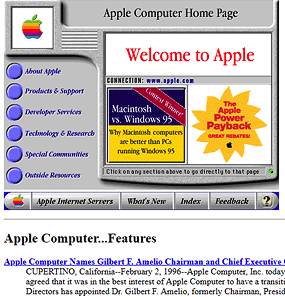
www.apple.com in 1996
Internet is a revolution!!! Pinging from Belgium a researcher in Ireland with Telnet in 1995 typing: ‘Are you reading this?’, and he types back ‘Yes’ — from Ireland! — in real time! — it’s an absolute miracle! Yahoo is a catalogue, not a search engine, you have to submit your website to them to be considered by humans for listing. Internet exists, but Google doesn’t. No tracing, no contextual ads, no bots, no toxic cookies, no Big Data, no unreadable user agreements, almost no registration, almost no moderation — the young world-wide web is anonymised, it offers privacy to its early users. It’s unbelievable in 2019, but freedom of the Internet is total! Web 1.0: content is generated by site owners, not users. E-mail is a revolution and a privilege for the academic and business communities.
E-mail is here, but communication remains natural through talking, phone calling and writing — I know voices, body language patterns, fragrance preferences and handwriting of people around me. Human interaction is 99% real (1% is e-mail): asking strangers for direction in a new country gives a great feeling of integration and human contact. Local people are not as accurate as Google Maps, but even if they give me a wrong direction it’s an adventure, a living experience from living souls.
We live free and behave naturally. We have no fear of being filmed/photographed by the first stranger with a smartphone. People don’t have a clue [yet!] they might involuntarily become world-known “youtube stars” when caught in a romantic affair outdoors or when dancing a funny dance for friends. Interesting things are watched by the eyes and lived, not filmed. Nothing is recorded, nothing is broadcast, privacy is total.
First “mobilophones”, a new etiquette: those sitting in a restaurant who don’t switch their phones off or even make their Motorola visible are seen as rude and badly educated. SMS cost money and are hard to type: think twice before you spam somebody with a series of worthless messages. As a result, electronic communication remains concise and meaningful, in no way it replaces physical interaction. At home the cell phone is always switched off: landlines are much better. Massive digitalisation is not there yet, Internet is one of the tools for the real life, not a virtual reality. And a holiday is still a holiday: no smartphone, no laptop, no 24/7 newsflow — total zen with just sea and sand.
We are not obsessed with security. There are no watchtowers with whistling lifeguards on every beach: we swim where we want and how we want. Wearing a belt in your own car is not an automatism. No chase for the eyedrops in the airports, even in the first post-9/11 years. No one warns us that the coffee is hot (it’s obvious), and most of Internet users have a 123 or azerty password.
We are not obsessed with anthropology: we don’t care who has what length of the nose, what colour/shade/nuance of the skin and what shape of the eyes. We deal with people, not races. They are looking at me, not at my skin. In the first Emoji release we are all equally yellow, not yet segregated by the racist Fitzpatrick modifiers. No special attention is paid to any group on any metric, and there are no specifically tagged groups — the society is naturally diverse and balanced without top-down political directives. I have no idea and no interest to know how many people of this or that anthropological build work in my organisation, and we are not counted, it’s normal, because — ugh! — labelling people is disgusting. Minds are healthy: children of all origins in the multicultural Belgium hug and kiss Sinterklaas and Zwarte Piet who are naturally associated with joy, sweets, smiles and gifts, never with colonialism.
All rights of all categories of people are fully secured. There is no point in struggling for the human rights: everything is already done. If you hold a EU passport you can simply enjoy your rights, do what you want, be what you want — the Free World is all yours!
Nobody counts men and women in European companies. The term “politically correct” is new, strange and funny — nobody believes we might ever have something similar here in Europe — what for?! The word ‘chairman’ doesn’t hurt anybody, ‘chairpersons’ are not yet invented. And there are no ‘persons’ yet, there are men and women happy to be what they think they are. There are ‘fathers’, ‘mothers’, ‘mesdemoiselles’ and ‘Fräuleins’, and everybody in the Free Europe is happy.
✉︎ Residents receive a letter starting with “Chers habitants, voisins et amis, nous recherchons un représentant pour le comité de l’école” and a mother enthusiastically replies and enrols. [What’s the point, again?? Read further.]
Minds are open in the Free Europe, freedom of expression exists and flourishes. Nobody plays the victim.
? My Belgian boss is a charismatic leader, he loves his team and he likes jokes. He draws arrows to a photo of a flock of goats published in the Financial Times putting our names: this goat is “John”, that goat is “Mary”, the ugliest is me as usual (the arrow reads “Mr Vodka”), and the photo circulates among the “goats” who will read the FT after the boss. At a team meeting he says it’s a pity that our pregnant colleague can’t defend our team in the tennis tournament because she’s “inflated again”. Another colleague is introduced to a visitor as a “case of social reintegration”. I am Mr Vodka for him for years, he re-writes my e-mail sent from a business trip in Cannes, adds an indignant comment “Do you find THIS acceptable???” and forwards the altered text to the team and to the management: “I’m so fine here on the beach, lots of free drinks and food, the sea is warm, the parties are crazy, the models are charming, thank you dear boss for having paid my holiday with company’s money, I’m lifting a glass of vodka to you”.
? My boss draws a beard on a photo of his direct report and pins this retouched photo to the wall with a comment: “Warning: Bin Laden” (the hunt has just begun). Times are different: nobody finds a slightest trace of insult in this. Times are really different: it’s his way, it’s absolutely fine for everybody, including the “inflated” and “Bin Laden” who is observing, without interest, his photo exposed for a week or two before it will be replaced by something else in the same style. Our society is still healthy: we tell the difference between what is ill-minded and what is not. (Spoiler: Nothing is ill-minded and has never been; I have never been a witness of a smallest offence, insult or harassment in the Free Europe world).… I wonder how long would such a boss stand in today’s 2019 before (s)he is fired and likely suited: half a day or half an hour?
Minds are healthy. Nobody feels offended.
? A foreign professor in my university doesn’t speak French well (he teaches in Dutch), he says to a female student: ‘Problème? Viens alors après les cours dans ma chambre, on va régler ça’ instead of ‘venez’/’passez’ and ‘mon bureau’ of course. She bursts out laughing, he gets it and begins to laugh too, nobody even thinks of a sign of harassment. And the word ‘harassment’ is strange, exotic, and definitely U.S.-flavoured.
The “Y2K bug” — will the missiles launch themselves? They don’t — and an ocean of happy people is counting down to Millenium on the Champ de Mars in Paris. “Trois, deux, un, bonne année!” — and from now on I’ll be writing/typing “19..” for my date of birth only. Some RER trains are delayed because of the restarted servers — that’s the only occurrence of the Y2K “bug” I can notice.
The euro! On 4 January 1999 I am the first client in town who converts the bank account from BEF to EUR — the whole staff of the branch are there to see that idiot. During 3 years the prices are shown in two currencies, and my early adoption of the euro scale helps me a lot in Spanish supermarkets and German museums, I feel home everywhere.
? The 2001 Christmas gift of my employer is a plastic bag with euro coins minted in Belgium with Albert II on the obverse — I can’t use the coins yet, it’s an early preview before the official introduction. I take the coins with me to Holland when visiting friends, and Jeroen doesn’t accept the proposed exchange of a coin or two: he thinks his NL-coins with the Queen are “more genuine” than mine with the King.
? Two weeks later the New Year 2002 is celebrated in the very heart of the united Europe in Jubelpark under the gigantic euro logo, countdown to 0, and at 1 a.m. I withdraw the first brand new €20 bill from the ATM. I have to wait for half an hour: people are queuing up in front of the street ATMs to touch the long-awaited European banknotes with Romanesque bridges and Gothic windows. Every day I check the coins I receive: in the first days of January they are Belgian only; then gradually French and German ones add up before a total dilution.
It’s unbelievable: we are only 59 years away from the martial logic of distrust and suspicion of the Fort Ében-Émael and the Maginot Line (and only 23 years away from the Francoism), but today we all share the same currency for the single market! And I am observing Polish and Hungarian battalions marching on Brussels’ Grand-Place in a military parade — Central Europe has recently joined the NATO. The probability of war in Western Europe is 0.0%, the EU has fully accomplished its initial mission. Hieronymus, I know you can’t believe that, but it’s true.
Dreaming is still big. Minds are agitated by incomprehensible but absolutely fascinating discoveries: decomposition of the human genome, the proofs of Fermat’s theorem and acceleration of the expansion of the Universe. And of course Dolly the Sheep is the absolute #1 newsmaker.
Goods are of good quality. Most objects can be repaired when broken, by a service centre or even by myself. Natural tactile interface with assigned buttons always at the same place, no multi-level menus.
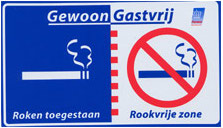 Smoking in a restaurant is perfectly fine, from McDonalds to the high-class Maison du Cygne on Brussels’ Grand-Place. At the entrance the waiter asks ‘Smoker or non-smoker?’ and everybody is satisfied. Our corporate cafeteria is split in two parts by an airtight glass wall: for smokers and non-smokers; we are free to choose where to go and our free choice is fully respected. Cigarettes’ brand names, logos and consumer information are on the pack, not inside the pack, and there are no photos of autopsies. Smoking is not a sin, non-smoking is not an exploit: enjoy your choice, enjoy your life.
Smoking in a restaurant is perfectly fine, from McDonalds to the high-class Maison du Cygne on Brussels’ Grand-Place. At the entrance the waiter asks ‘Smoker or non-smoker?’ and everybody is satisfied. Our corporate cafeteria is split in two parts by an airtight glass wall: for smokers and non-smokers; we are free to choose where to go and our free choice is fully respected. Cigarettes’ brand names, logos and consumer information are on the pack, not inside the pack, and there are no photos of autopsies. Smoking is not a sin, non-smoking is not an exploit: enjoy your choice, enjoy your life.
 A bank account abroad is not a sin either, it can be numbered if you wish, it’s all fine. Cash is not a problem, paying with a 10000 BEF bill is OK, the payer is not treated as smuggler or trafficker, while electronic payments with Bancontact cost money: 5 BEF per transaction. Mrs. Doubtfire and Rabbi Jacob are family comedies, not offences against anybody. Tintin and Disney are not censored. Common sense in most areas: driving without lights at midday is an evidence (and the motorcyclists are happy because they are much better discernible when only their lights are on). Trivial medicines may be bought without prescription: I decide what is good for me and what to take, not the State.
A bank account abroad is not a sin either, it can be numbered if you wish, it’s all fine. Cash is not a problem, paying with a 10000 BEF bill is OK, the payer is not treated as smuggler or trafficker, while electronic payments with Bancontact cost money: 5 BEF per transaction. Mrs. Doubtfire and Rabbi Jacob are family comedies, not offences against anybody. Tintin and Disney are not censored. Common sense in most areas: driving without lights at midday is an evidence (and the motorcyclists are happy because they are much better discernible when only their lights are on). Trivial medicines may be bought without prescription: I decide what is good for me and what to take, not the State.
Massive recycling starts in most parts of Europe (even my unused Para 9mm cartridges can be recycled) — it’s a responsible choice of responsible citizens, not a religion yet.
What else? Life is beautiful. The world is nearly perfect, the Free Europe pattern in my kaleidoscope is showing me a beautiful picture of a nearly ideal society. This Europe is the ‘City upon a Hill’, the Europe I was dreaming of on the grey Socialist side of the Iron Curtain. This Europe of 1995-2006 — free, democratic, open-minded, open to discussion, diverse, healthy, strong, self-assured and proud of itself — is indeed the ‘beacon of hope‘ I was imagining when I was heading my SW radio antenna to the West and when looking westwards through the barbed wire in Berlin. This Europe is for me the benchmark of a fair, pleasant and comfortable world you want to live in and to be part of. Europe is at its zenith.
Thank you Kaleidoscope for this chance to have enjoyed Europe in its best times. I live free in the very heart of the Free World and there is nothing to complain about: Western Europe offers security, prosperity, comfort, fun and — of course! — freedom.
? Pattern #5: ‘1984’ in the Post-9/11 world
The Twin Towers change everything, they trigger a tectonic shift in the Western society. Shocked by 9/11 and driven exclusively by irrational fear the Western citizen quickly abandons the very essence that had been shaping the West for centuries: freedom.
 It starts with the Patriot Act in the US which establishes total surveillance at the expense of personal freedoms. Very soon the whole set of freedoms falls like a domino chain. Capitulation of the Citizen to the State is immediate, unconditional and voluntary, with no regret about centuries of struggle for personal freedoms as if they never existed.
It starts with the Patriot Act in the US which establishes total surveillance at the expense of personal freedoms. Very soon the whole set of freedoms falls like a domino chain. Capitulation of the Citizen to the State is immediate, unconditional and voluntary, with no regret about centuries of struggle for personal freedoms as if they never existed.
Unarmed and unprotected citizens paradoxically demand (and immediately obtain) tighter gun laws. The PRISM scandal is a non-event for 99%, even for the German chancellor who is being spied for years. Besides the Libertarian Party in the US (historically oscillating around 1% of popular votes) no political force raises the voice to repulse Big Brother. No such force at all in Europe. Only a mere handful of people resist, but Assange is imprisoned, Snowden is an eternal refugee, and no one else cares.
«Those who would give up essential Liberty, to purchase a little temporary Safety, deserve neither Liberty nor Safety» — Benjamin Franklin’s saying of 1755 becomes a dismal prophecy from 2001 on. We have pre-paid safety with our liberty, but our purchase is still not delivered.
I’m asking my local police how to protect my house against homejacking and a Belgian police officer advises me to… have my wallet and car keys ready right on the chest in front of the door: “So the homejackers grab it and go away, and THEN you can call us”. Wow.
Privacy is dead. “Telescreens”: whatever I do, I am scanned, filmed and recorded. GPS tracking, QR codes, drones in the sky, radars on the road, face recognition on the street, voice recognition in banks’ call centres, UV scanning in the airports: “that’s for your security”, they always say. Biometrics is fully operational. Deanonymisation is always running in the background.

Even the plots of the Post-9/11 police series completely change: the Holmesian method is useless, Poirot and Maigret are losers, because the real winner in the battle is the one who had installed more cameras and who has access to Big Data. “Get the recordings from the lobby on June 15 at midnight. Zoom it in. Zoom in. Zoom in. Run face recognition. Oh, it’s John Smith! Locate his cell phone. Arrest him. The end, directed by,..”
And then it comes, slowly but surely — Dogmatism, the new indoctrination of the XXI century. A “new ethics”. A new ideology without name.
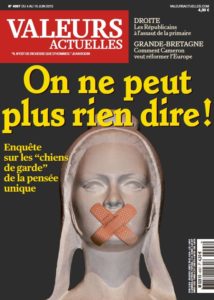 From now on, things may be binary “good” or “bad” with no shades in between. Critical thinking breathed its last. Demonstrating independence of mind and freedom of judgement may be dangerous. Defending (and even having) one’s own convictions becomes a challenge. Dissidents become outcasts, driven out by the new bien-pensants. Diversity is solemnly proclaimed, but the interpretation of this greatest word is one-way, like a diode: once your opinion differs from the narrow ideological mainstream, your diversity stops here. No interest in saving pandas makes you suspicious. Asking neutral and unbiased (!) questions about the climate puts you in a grey zone. No participation in struggling, again and again, for the rights that have already been fully secured years/decades ago puts you in a dark grey, almost black zone. Using words and concepts from the Free Europe era puts you in the black zone. Men behaving as men and women behaving as women put themselves in a deep black zone — femininity and masculinity are nearly outlawed.
From now on, things may be binary “good” or “bad” with no shades in between. Critical thinking breathed its last. Demonstrating independence of mind and freedom of judgement may be dangerous. Defending (and even having) one’s own convictions becomes a challenge. Dissidents become outcasts, driven out by the new bien-pensants. Diversity is solemnly proclaimed, but the interpretation of this greatest word is one-way, like a diode: once your opinion differs from the narrow ideological mainstream, your diversity stops here. No interest in saving pandas makes you suspicious. Asking neutral and unbiased (!) questions about the climate puts you in a grey zone. No participation in struggling, again and again, for the rights that have already been fully secured years/decades ago puts you in a dark grey, almost black zone. Using words and concepts from the Free Europe era puts you in the black zone. Men behaving as men and women behaving as women put themselves in a deep black zone — femininity and masculinity are nearly outlawed.
Common sense is no more, it’s quickly eliminated by the New Dogmatism. Unexplainable prohibitions.
They confiscate my opened can of Fanta and my water-based hand sanitiser at the airport security. I may not wear my bike helmet in a supermarket and no security guard can tell me why it’s forbidden. The French State takes ibuprofene and acetaminophen off the shelves in pharmacies: they think I can’t read. The French State refuses me the right to buy a trivial nasal decongestion spray because I might “mishandle” it. The Swiss State refuses me the right to buy circuit breakers, to make my Garmin display the current speed limit, to own a radar detector, to…, … They “know better” what is good for us, so we are under a 360° “parental control” of the State.
Bank secrecy is dead. My foreign bank first sends the interest statement to my local taxman, and only then to me the client. Payment in cash is not welcome, €200 and €500 bills are massively refused. Dogmatism reigns on the road too: formal respect of theoretical speed limits becomes more important than watching out and keeping control. Animals are nearly equalised in rights with us humans: animals should be called ‘he’ and ‘she’, while we should not: we are now ‘they’. Cigarette is the universal scapegoat, raising tobacco taxes is the universal answer of any government to any economic problem.
The Western population readily and joyfully adopts this new Ideology Without Idea. We don’t know whom we serve and why, we have no goal and no roadmap. We are facing a number of threats to our civilisation, but we resolutely refuse to use force whatever the circumstances. We citizens disarm ourselves by default, we think that the problems will be solved by a collective performance of “We Are the World, We Are the Children” in a circle hand in hand. We feel shy of our identity and success. Unlike the Soviets we don’t put earplugs in our ears and filters on our eyes — no, we happily ingest everything. We are afraid of making a step away from the herd, afraid to enjoy our unique personality, afraid to make independent decisions, we are simply afraid to be ourselves. We want to be nice to everybody, we are frightened of making noise of all kind and we jump at your own shadow. We have completely lost the sense of humour. We readily follow the alarmists of all sorts and ages, we are seriously thinking of prohibiting paddling on the Geneva Lake because one Leftist said some birds might be unhappy to see us sailing. We fully commit ourselves to the new ideology without understanding what it is and even without knowing what is its name.
Some people erroneously call the above “European values”, but it is quite the opposite to what has always been known as European (and wider — Western) values including freedoms, individualism, competition, common sense, progress, pragmatism,.. What is it then? Metamodernism? Postmodernism? Post-Truth? Orwell’s “Animal Farm”? Something else?
Docile, uncritical, naive, silent — we made ourselves ready for any sort of manipulation. Dictatorship will not come in a form of Robespierre, Mao or a coup d’état run by bad guys — no need! — the old kind fear will do the job. It all started with fear in 2001, remember? and fear alone will continue to drive our society. Just one spark — a new planet-wide virus, a new terrorist attack or even a planned false alarm — one spark is enough for the governments to finish the job of making of us a perfect bunch of sheep. We are ready. One spark — and we will readily finish undressing, we will docilely download governments’ tracking apps (for “our own security”, of course, as usual), we will be registering in public places and supplying all sorts of biometric and behavioural data the governments don’t yet possess. We latently want to be governed.
Environmentalism becomes our new religion. Recycling (which is per se a trivial hygienic routine like toothbrushing) is its main rite, it quickly becomes an obsession. And Orwell’s modernised “doublethink” is best seen on our recycling lots.
Those very people who are proudly decomposing a used teabag into Paper (label), Metal (staple), Organic (tea leaves) and Non-Organic (nylon and cord) see no problem in taking a 777 to spend holidays on the opposite side of the globe because the place is trendy. I want to ask: “My friend, I admire your
showmove with the teabag, but why don’t you start struggling for the planet by refusing to cut a natural tree every Christmas? And by stopping your over-consumption? Are you sure you need this 5.0 mastodon to drive in our small town with narrow parking lots and draconic speed limits of 20/30 kmh? — this kind of questions are useless to ask the (wo)man at the recycling lot, they will remain rhetorical in our doublethink world.However, the best doublethink example is the biker. He obeys no rules, he never gives priority to the pedestrian at a crossing, he is the uncrowned king of the road, and if there’s a problem he will play the victim, always. This angel is not polluting the air, so
what?we forgive him/her everything.
This new Dogmatism encourages linear primitivism: out of an infinite list of elements we pick up just one, and we stop there. When running for President, the brilliant Barack Obama bears, as any other candidate, an ∞ of important and relevant qualities, but only the [absolutely irrelevant!] colour of his skin comes to the centre of public interest. Black, white, whatever — who cares, really?!! — I was never paying a milligramme of my attention to the shade of colour of somebody’s skin, but now they inform me every day, by force, about racial and gender percentages in governments and organisations — hey, stop, I don’t need your racial statistics! I want to continue dealing with people, not with melanin. I still don’t care about anthropology and will never do, but they insist again and again with their unsolicited pie charts that humiliate all groups they are so scrupulously counting.
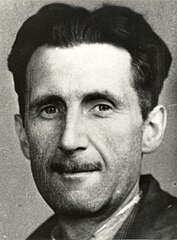
George Orwell, author of ‘Nineteen Eighty-Four’ and ‘Animal Farm’
Freedom of speech is abolished by censorship; and what is much more sad — by self-censorship; and what is even more sad — by self-censorship of good people without any reason or any second thought. No offence never takes place, nothing is wrong, but people get used to start every second phrase by a disclaimer like: “I’m not blaming anybody,..” or “I have nothing against [X/Y/Z],..” whatever they speak about: windy weather, high taxes or traffic jams. They do it just in case, as a precaution against a “thoughtcrime“, because in the binary 1/0 “good/bad” paradigm it’s very easy to get your forehead stamped by an absurd and undeserved label even if you were speaking about short holidays. The genuine meaning of the Je suis Charlie movement is misunderstood by 95% of participants: days after the murder the false self-proclaimed charlies bring back the scotch tape to their own mouths and they resume shushing at the true charlies who left their mouths unscotched.
Freedom of expression is formally abolished by “newspeak“, which is called “politically correct”.
I always thought I grew bald, no — I just became “comb free”. I thought I was an immigrant, no — I am a “newcomer”. I was myopic, now I’m “visually challenged”, I was a chairman of an association, now I’m just a “chair”
with four legs. “Newspeak” rules, students massively become “participants”, professors become “formateurs”, fathers and mothers are replaced by “Parent #1” and “Parent #2”, and a newborn baby is “Madame”. Hieronymus, please amend the 5th Commandment in your prayer book: “Honora parentum primum tuum et parentum secundum tuum”.
People feel offended for absolutely no reason in 99.9(9)% if not 100% of “cases” invented out of thin air. Some people are offended by the word ‘OK’, some others by the word ‘boy’. Apologies all the time, everybody apologises: actors, professors and princes of blood. Instead of presenting the fantastic Rosetta mission, the astrophysicist Dr Taylor apologises for his shirt he received from his girlfriend. Sacha ‘Borat’ Cohen is flooded by complaints and lawsuits. The new Cancel Culture is the full equivalent of Orwell’s “memory hole“. The “cancel” punishment applies to those who still behave as if the freedom of expression existed, to those who accidentally cross the invisible red lines present in some overexcited minds. Philanthropy, leftism, £1mn for the Labour and even Harry Potter didn’t save J.K. Rowling from “cancellation” after a tweet in support of a fired woman: no one tries to understand the complexity of things in the Dogmatist World, they just “cancel”.
Here and there they massively apologise for said and unsaid words, supposed thoughtcrimes, untaken positions and unmeant meanings.
✉︎ Residents again receive a letter, this time reading: “Chers habitants, chères habitantes, chers amis, chères amies, che(è)r(e)s voisin-e-s! Nous, les femmes et les hommes de la commune, recherchons, en toute transparence, égalité et respect pour tous les groupes de la population sans exception, un.e nouvelle/nouveau acteur.ice.s de changement et citoyen.ne responsable, à savoir un-e représentant-e (f/h) pour le comité de l’école, un endroit où les filles et les garçons de notre commune […]”, and an offended mother is furious about the letter because it starts with the masculine form. She refuses to enroll in protest and the letter goes to the recycle bin.

Smile, you are on camera
Politics is ‘post-truth’ politics. Citizens’ opinion is of less and less interest. All of Central Europe vote in national referenda to enter the European Union, the “groom” largely says ‘yes’ (up to 94% in certain countries, source), but nobody asks the “bride”: the Old Europe’s opinion is simply ignored. I would have voted ‘yes’ for 10 out of 12 new members, but I want to be asked! Sometimes they ask, but then they drop the idea: French, Irish and Dutch voters reject the EU Constitution, but the EU imposes the Lisbon Treaty without talking to us any more. The prosperous UK is unfortunately slamming the EU door, and in front of this door we see countries whose GDP per capita is 24 times lower than their future economic “peer” Luxembourg [source]. Protests materialise in the anti-establishment movement, which is ostracised, as usual.
While our liberties are rapidly losing ground, there is taking place an absolutely fantastic digitalisation of the planet. Internet quickly proliferates in width (number of users) and in depth (functionality) and revolutionises everything: communication, work, entertainment, shopping, banking, dating, reading, writing, travelling — literally everything. Information has never travelled as quickly and easily as today. Economy becomes Internet economy. Web 2.0: content is created by the users before being severely censored by the platforms. Artificial intelligence everywhere. Getting online help from the bots “Amanda” and “Simon”, not humans. Smart homes. Digital “social credit” and perpetuity of electronic traces: what has been published on the web will remain for eternity in caches and screenshots. No more incautious sayings and spontaneous jokes — think twice before you type something or even better… don’t publish anything, so you’ll be better off. Hieronymus, you could “undo” your mistakes through penance, we can’t.
Digitalisation brought comfort, and we paid this comfort with our freedom — with what remained from our freedom after 9/11.
Over millions years of evolution the human body was losing unnecessary parts: tail, supernumerary nipples, 8th teeth,.. Now for the first time the human body receives something. This extension is called smartphone. This unexpected acquisition changes the very nature of the human, the way we think and reason.
No more need to compare facts and opposite viewpoints from multiple sources: the first line of a Google search tells it all. No need to learn languages: Google Translate is enough for most uses. No need to talk to people: a short texto is better. No need to develop social skills: a digital community is enough. No need to make homo sapiens’ brain work to remember formulas, physical constants, names of the streets, dates, poems, names and numbers of the motorways — most of the brainwork is outsourced to the external piece of metal. How do I know where is the North, how to calculate the volume of a cone or how to recognise a constellation in the night sky — no clue, but there is an application for everything. Right, Siri?
The human brain went on holiday. As a result, the average IQ of the world population started dropping by ≈ 0.2 points a year. (“Ignorance is strength”? © G. Orwell) The mankind has probably passed the peak of its intellect: the turning point appears to have occurred in the mid-90s (source: this BBC article, google for more). That would amount to a seven-point difference between generations. Hieronymus, we are going back to you, see you soon.
Smartphone in hand at all times means 24/7 inclusion (and intrusion) around the clock — obligation to react to instant messages within seconds, the worst behaviour is “has seen my message, but hasn’t replied yet”. Smartphone becomes clothes: it’s impossible to leave the house without the trousers and the smartphone.
Smartphones changed our language, they established a new epistolary etiquette for 7+ billion people. A text message using 26 characters without emoticons is regarded as cold and impolite. “A birthday party on the beach? Excellent idea! Thank you very much!” is far better to be replaced with “?? ??????⛱??❣️????❗️‼️”.
Hieronymus, have you heard of the Egyptian hieroglyphs, those eagles, owls, bulls and snakes? We have them in our WhatsApps. Though to eagles and owls we prefer cats with tears, eggplants and piles of poop.
Smartphones changed our writing style too — long reads (like this one) without action buttons and embedded funny videos with dancing dogs have no right to exist. Only short-lived news matter, only simple quickly scrollable information can be of interest.
At the same time the mankind is living a fantastic progress in the offline! Healthcare, machinery, pharma, automotive sectors are revolutionised. Steady growth of the world economy. Incredible rise of China from ashes to #2 in the world (Have you ever heard of China, Hieronymus? It’s a vassal of the Mongols). Social peace. Prosperity. Abundant offer. Large choice of goods and services, sizes, colours and shades from all over the world. Accessibility of travelling: with a low-coster I can cross Europe for €15, that’s less than the first euro bill I withdrew back in 2002. Internationalism and multiculturalism push aside the narrow-minded nationalism. Supranational self-consciousness is gaining more ground. Globalisation is economic and cultural: Apple Music’s Top-100s are nearly identical across 150 countries. Automation of processes that used to be operated by humans. Disappearing professions, emerging professions. Ageing population: even the 25-year-old are concerned about their pension. Quotas. Undemocratic affirmative action (aka positive discrimination) is the new normal that nobody dares to recognise publicly — it’s very dangerous to call a spade a spade in 2019. Solar panels on the roofs and gigantic windmills change the landscape of Europe. Religion declines dramatically.
The Saint Clement church in my village remains empty and deserted two out of three Christmas Eves: the mass is celebrated in turn in one out of three Roman Catholic parishes — there are not enough people to fill three (even two) small churches at the same time. The former chapel is converted long ago into a social centre. Hieronymus, I know you can’t believe that, but I’m not lying.
Dreaming? Of course! But galaxies, science, genomes and life on Mars are of no interest. The most thrilling intrigue of the year is how the new iPhone will look like: with a vertical or a horizontal camera — that is the question.
As parents we Gen Xers are the opposite of our parents Baby Boomers: we micro-manage our children Gen Z-ers, we live their lives not ours, we wrap them in a cotton-wool, we give them 10× more time and involvement than we had received from our parents Baby Boomers. We have convinced our kids that the world is a dangerous place, while we perfectly remember we were living in 100× harder times and we didn’t think then it was dangerous at all.
Gen Z-ers naturally have their ideals and heroes, but goddamn, sometimes I feel they envy us Gen Xers our rooting into the real world, our real emotions. And of course we Gen Xers will blow up any Gen Z-ers’ dance party with the first notes of our One Way Ticket, Hafanana, Life is Life or Бу!-ра!-ти!-но!
✸✺ ❈ ❊ ※ ✻ ❅ ✽ ❄︎ ❀ ✾ ✿ ❃ ❁ ❇︎ ✸
I must have under-rotated my kaleidoscope because my Post-9/11 pattern looks suspiciously like something I’ve seen in the very beginning of my observation. After so many radical changes in the kaleidoscope we in 2019’s Europe are incredibly far from the gloomy socialism, but… what do I see in my 2019 kaleidoscope? Too many ☭-occurrences to be simple coincidences.
☭ 2019 The Soviet homemade shit from “solidarity fairs” is here again — now under the Greenpeace/WWF banner.
☭ 2019 Repeating every word in two grammatical genders is a literal flashback from the Lenin-Stalin times with the ubiquitous ‘kolhozniki i kolhoznitsi’, ‘rabotniki i rabotnitsi’ (“he-workers and she-workers”) etc. in every address. Already under Khrushchev this redundancy looked useless and obsolete, but today the old kind 1930s style is surprisingly back again.
☭ 2019 The old kind “kitchen conversations” are back. About everything, openly, humorously, as free men, but only among close friends of trust and only live (the public sphere and Internet are severely censored — again!). My Geneva kitchen turns into a Leningrad kitchen: I didn’t want it to, but it does.
☭ 2019 The old kind 1st of May is in 2019 identical to what I’ve seen in the USSR with the difference that the Soviets did it lazily to tick the employer’s box, while today’s marchers are really motivated by the socialist ideas: ‘Bandiera rossa’ sung on a Genevan street is a time machine taking me back to Leningrad, again.
☭ 2019 The old kind socialist holiday of the 8th of March, established by Clara Zetkin and glorified by the Soviets for 73 years (it was an official holiday), is celebrated in 2019 Switzerland loudly and fervently: with full coverage of the press, with mandatory lectures at schools, with rallies and women’s strikes. For the Soviet people the Socialist roots of the 8th of March were completely forgotten: no politics, no fervour, it was just a good occasion to celebrate women, just a good reason to buy flowers.
☭ 2019 The old kind visual propaganda! I thought you died in the USSR by ±1988, buried by Perestroika… but… you resurrected from ashes in the Post 9/11 West. Information boards in universities and high schools are filled with propagandist materials, and sometimes you can’t see the colour of the walls: walls are densely covered with the posters affirming boring truisms (in case you forgot).
☭ 2019 Even the old kind ☭ polit-informatias at schools are back! With different topics, but with the same mandatory presence of pupils (teachers are noticing the absent) and with powerless
☭ 2019 The old kind Soviet zeal for collecting recyclables is back, but it’s more fervent now: the Soviets were recycling because of poverty, we recycle because of the principles.
☭ 2019 The fervour of the activists in 2019, in general, reminds me the revolutionary fervour of the first decades of the USSR. With a revolutional fervour we struggle [for the already acquired concepts]. With a revolutional euphoria we sincerely believe we are “saving the planet”. With a revolutional merciless we aggressively label and cancel the independent minds.
☭ 2019 Obedience and muteness of the masses is highly recognisable and identical to the late Soviet times. “Take low profile and shut up, you’ll be safer” is again the most wise advice to give and to follow.
☭ 2019 The Soviet rejection of alternative opinions is alive: new and old “uncomfortable” political parties across Europe are ostracised and put beyond the “cordon sanitaire”; it’s a good taste and a mandatory rite in 2019 to spit upon the Trump family whatever they do or say.
☭ 2019 The official Europe never takes Israel’s side in any political dispute regardless of the facts and circumstances: who is Mr Nyet today?
Today’s militants and defenders of the already defended are way more ardent and uncompromising than those sluggish Communist “activists” from the 70-80s. If the Communists had hired today’s defenders of the defended, the USSR would have never collapsed, that’s for sure!
Though… no, no chance… Today’s Western militants would have refused the job: they prefer to safely defend the already defended in the sterile streets of Geneva or Oslo with a glass of hot wine after the march than to defend what really and dramatically needs to be defended in Moscow, Tehran, Riyadh, Ürümqi, Ashgabat and many other places, where a Western action would really make a change. Thís, for example (photo) is a real problem, not my plastic straw. But the militants focus on my straw that will never finish in the ocean from the landlocked Switzerland.

↑ A street sign from the GDR. Or… from a today’s street? Not sure any more.
All kidding aside — having forgotten that equality of rights and opportunity has already been granted to everyone in the developed world, they want now the equality of condition: forced wage-levelling, base income for everyone, quotas, prohibitive taxes, etc. But… wait… sounds familiar… the “equality of condition” is what? — it is exactly, 100%, letter for letter, the very central point and the ultimate goal of the Marxist Communist model.
They say: ‘We are struggling for a good cause!’ Maybe, but any ideology struggles for a “good” cause, none has ever struggled for a “bad” one. They say: ‘You can’t compare us to the Soviets! It’s different!!’ Different in what? In names, yes. In symbols. In details. Not in fundamentals. All closed-minded indoctrinations are fundamentally similar, even if they don’t bear a name.
My vaccine from the Socialist Pattern #1 makes me extremely sensitive and watchful to this kind of things, I am unfortunately in a good position to judge: a burnt child dreads the fire.
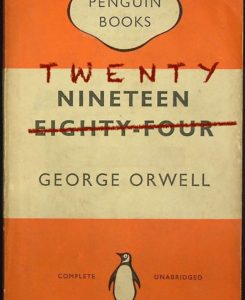
I’m observing the current Post-9/11 Pattern #5 and I see dogmatism on all levels, indoctrination, end of the freedom of expression, end of privacy, “cancel culture” meaning ostracism and social exclusion for the dissidents (and even for those who were named dissidents without being dissidents), fear to destroy one’s career because of an innocent joke judged misplaced in someone’s morbid imagination, an almighty state that wants to issue a directive for everything, total surveillance, docile citizens giving up their freedoms and voluntarily stripping to the skin in front of the state and each other, an army of genuinely motivated ardent defenders of a new Ideology Without Name — which pattern is more Orwellian: Classic Socialism or Post 9/11?
Was I completely wrong on Dec. 25, 1991 believing that in the new post-communist world it would be done for good with dogmatism and indoctrination? Was it that difficult to live free? Does history really go in circles?
Back in late 80s I had no doubts that ‘Nineteen Eighty-Four’ despite its British European setting was a parody of the Soviet society: telescreens, newspeak, doublethink, memory holes, thoughtcrimes — I found Orwell’s text very funny then. I was mistaken: it’s not funny and it’s not about the Soviets. The European setting was not an accident. It’s about here, it’s about today, it’s about us.
The circle is closed.
The splendid European ‘City upon a Hill’ I love so much is no more.
Only one though fundamental thing went wrong in the West: we ceased to be free. Who forced us? A conqueror? Genghis Khan? Martians? No. We did it ourselves. We have switched off the ‘beacon of hope’ for the soviet unions of today — who can be inspired by the Orwellian “Ingsoc” society like ours?.. In the former lighthouse we have opened a CO2-neutral auto-flagellation centre to purge the sins we have not committed.
Oh shit… how did we get there?
? An overlapping Pattern #5.1: Living for the others
Erase — once again!! — from your memory what you’ve read so far, because the above was valid 1) for real 3D protein-based life, and 2) for our own lives. Both concepts are outdated. Most of us have moved to the Fairyland of a planet-wide showcase of vanity and illusions — the social media are replacing the real world. All kaleidoscopes are now virtual.
Do you remember those [naive and absolutely ridiculous today] concerns about intrusion in private life in “Das Leben der Anderen“? Those concerns were next to nothing. The new paradigm is exactly the opposite — “Das Leben für die Anderen”.
This time it’s not Big Brother from the above Pattern #5 who shadows us from outside with cameras on the street poles. No, this time it’s different. It’s now a camera we have set up. Social media incite us this time to act from inside: billions of people voluntarily (!!) turn their home telescreens on and broadcast their lives urbi et orbi: what they eat, where they go and whom they meet. What was not yet leaked to Big Brother is now voluntarily transmitted to Big Data as we say we “have nothing to hide”.
The new currency of the humanity is the ?. Real friends are replaced by virtual subscribers. Real helping action is replaced by adding a black ribbon to the avatar for a day. Demagogical equivocation: shadowing others’ window-dressed lives is called communication with friends; posting and following informational garbage (a sunset, a kitten, a banal sight, a banal wisdom, a photoshopped selfie with a Madame Tussauds wax celebrity,..) is regarded as “having an active social life”; deep social isolation caused by spending 8 hours a day scrolling others’ ideal stories is presented as inclusion and meaningfulness.
In 2018, in the Louvre, I notice with horror that out of 150+ people in front of Mona Lisa only one (one!) lady is looking at the painting with her own eyes, all others are looking at their smartphones filming and taking photos of Mona Lisa. For whom, for themselves? Very unlikely: high-quality posters of all sizes are sold in the Louvre Shop downstairs. For whom then, for Instagram?.. All of them for Instagram?..
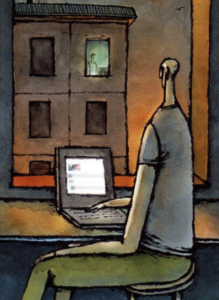 Social media spared us the necessity to reach a certain intellectual level to deserve the right to get to the tribune. 3-minutes registration and hop — you can start criticising Stephen Hawking. But… strictly in line with the policies: Facebook/Twitter policies in 2019 are comparable to the Soviet ones, and I am asking myself where could I express myself more freely: in the 80s in The Cactus school wallpaper or today on Facebook. I hate to say, but The Cactus was more democratic.
Social media spared us the necessity to reach a certain intellectual level to deserve the right to get to the tribune. 3-minutes registration and hop — you can start criticising Stephen Hawking. But… strictly in line with the policies: Facebook/Twitter policies in 2019 are comparable to the Soviet ones, and I am asking myself where could I express myself more freely: in the 80s in The Cactus school wallpaper or today on Facebook. I hate to say, but The Cactus was more democratic.
A covered camera and a scotched mic on Zuckerberg’s personal laptop, a series of Facebook-WhatsApp scandals and rare feeble attempts to draw attention to the problem [Example One, Example Two] don’t scare the uncaring users — whatever happens the world must see a trillionth crooked fuzzy photo of Mona Lisa.
… and then?
Only 40+ years of conscious life and such a kaleidoscope!
| Classic Socialism (70s and early 80s) | Perestroika (1986-1991) | Post-Soviet Early Nineties | Free Europe (1995-2006) | Post-9/11 (early start in the U.S. in Sep. 2001, visible effects in Europe ±5 years later) | |
| Personal freedom | Lowest | High | Highest | High | Low |
| Freedom of speech | Low | High | Highest | High | Lowest |
| Privacy | Lowest | Medium | High | Highest | Lowest |
| Safety | High | Medium | Lowest | High | Medium |
| Living standards | Low | Lowest | Low | High | High |
| Social comfort | Low | High | Lowest | Highest | Medium |
“O mein Gott…”
Poor Hieronymus from the Holy Roman Empire! He has not seen a pro mille of what I have ⤴︎. Our successors the Millenials (Gen Y-ers) are enjoying the most part of the show with us, but Gen Y-ers have missed the unparalleled Socialism – Iron Curtain – Cold War tragicomedy, which was key to understanding the Post-9/11 world. Gen Y-ers have not been vaccinated against the dogmatism, which makes them an easier prey for manipulators than us Gen Xers.
Along with the Baby Boomers we Gen Xers are very lucky to be witnesses of such a diverse range of political and social systems, lifestyles and moral values, East and West, socialism and free market, crazy freedom and oppressive indoctrination, real world and an imaginary slideshow — all this through a series of social and technological revolutions. For us Gen Xers the needle of the compass has changed directions several times, and every pattern in my kaleidoscope was very [radically] different from the previous one.
The 2010s are counting their last hours, the bottle of champaign is ready in the fridge, it’s an ideal moment to take a deep breath, look back and sum up.
The show has been absolutely fantastic that far.
My lucky Generation X is still powerful in today’s world, but Generation Z is already entering the market. For natural reasons the Gen Z-ers have only seen the Post-9/11 and Living for the Others pictures — what understanding of good and evil will they have with only this experience under their belt?
And what comes next? The Matrix? Teleportation? Spare body parts made of plastic? Colonisation of Mars? Travelling through time? Or… rather a GPS biometric chip under the skin, an embedded beacon continuously transmitting to Big Brother my location, heartbeat, face expression and respiration rate — all this for “my security” of course?
I would prefer a plastic nose then.
— Geneva, 31 December 2019
All photos are taken from open sources on Internet, it’s not my photo collection. Names may have been altered for privacy-protection purposes. Facts are never altered. Public comments are disabled, your feedback is welcome here.
